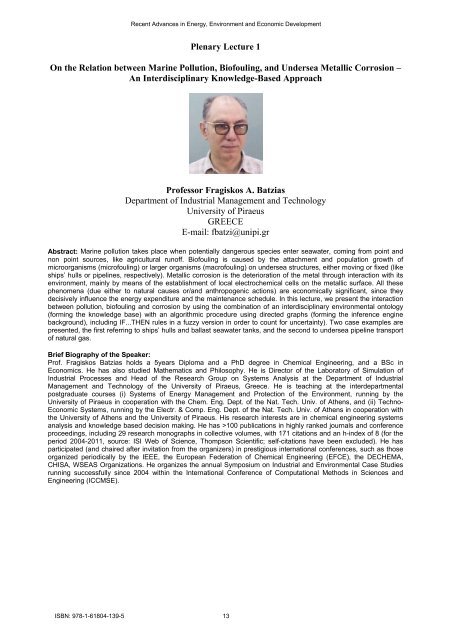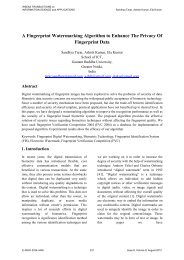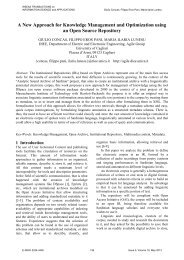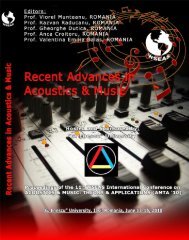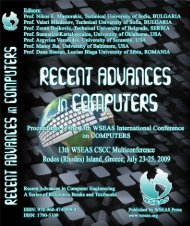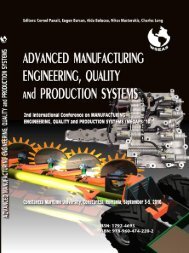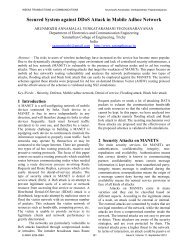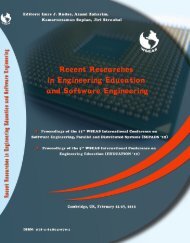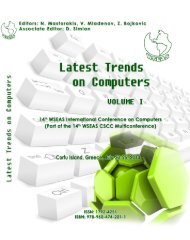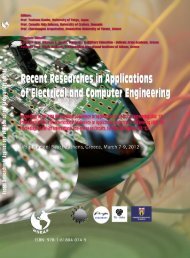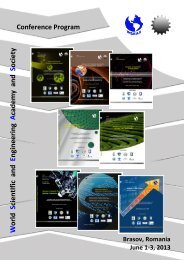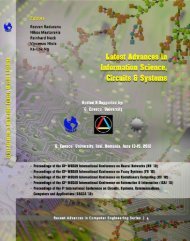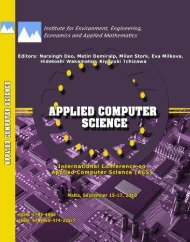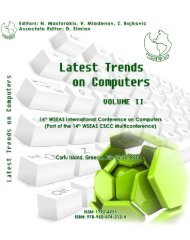Contents of this book - WSEAS
Contents of this book - WSEAS
Contents of this book - WSEAS
You also want an ePaper? Increase the reach of your titles
YUMPU automatically turns print PDFs into web optimized ePapers that Google loves.
Recent Advances in Energy, Environment and Economic Development<br />
Plenary Lecture 1<br />
On the Relation between Marine Pollution, Bi<strong>of</strong>ouling, and Undersea Metallic Corrosion –<br />
An Interdisciplinary Knowledge-Based Approach<br />
Pr<strong>of</strong>essor Fragiskos A. Batzias<br />
Department <strong>of</strong> Industrial Management and Technology<br />
University <strong>of</strong> Piraeus<br />
GREECE<br />
E-mail: fbatzi@unipi.gr<br />
Abstract: Marine pollution takes place when potentially dangerous species enter seawater, coming from point and<br />
non point sources, like agricultural run<strong>of</strong>f. Bi<strong>of</strong>ouling is caused by the attachment and population growth <strong>of</strong><br />
microorganisms (micr<strong>of</strong>ouling) or larger organisms (macr<strong>of</strong>ouling) on undersea structures, either moving or fixed (like<br />
ships’ hulls or pipelines, respectively). Metallic corrosion is the deterioration <strong>of</strong> the metal through interaction with its<br />
environment, mainly by means <strong>of</strong> the establishment <strong>of</strong> local electrochemical cells on the metallic surface. All these<br />
phenomena (due either to natural causes or/and anthropogenic actions) are economically significant, since they<br />
decisively influence the energy expenditure and the maintenance schedule. In <strong>this</strong> lecture, we present the interaction<br />
between pollution, bi<strong>of</strong>ouling and corrosion by using the combination <strong>of</strong> an interdisciplinary environmental ontology<br />
(forming the knowledge base) with an algorithmic procedure using directed graphs (forming the inference engine<br />
background), including IF...THEN rules in a fuzzy version in order to count for uncertainty). Two case examples are<br />
presented, the first referring to ships’ hulls and ballast seawater tanks, and the second to undersea pipeline transport<br />
<strong>of</strong> natural gas.<br />
Brief Biography <strong>of</strong> the Speaker:<br />
Pr<strong>of</strong>. Fragiskos Batzias holds a 5years Diploma and a PhD degree in Chemical Engineering, and a BSc in<br />
Economics. He has also studied Mathematics and Philosophy. He is Director <strong>of</strong> the Laboratory <strong>of</strong> Simulation <strong>of</strong><br />
Industrial Processes and Head <strong>of</strong> the Research Group on Systems Analysis at the Department <strong>of</strong> Industrial<br />
Management and Technology <strong>of</strong> the University <strong>of</strong> Piraeus, Greece. He is teaching at the interdepartmental<br />
postgraduate courses (i) Systems <strong>of</strong> Energy Management and Protection <strong>of</strong> the Environment, running by the<br />
University <strong>of</strong> Piraeus in cooperation with the Chem. Eng. Dept. <strong>of</strong> the Nat. Tech. Univ. <strong>of</strong> Athens, and (ii) Techno-<br />
Economic Systems, running by the Electr. & Comp. Eng. Dept. <strong>of</strong> the Nat. Tech. Univ. <strong>of</strong> Athens in cooperation with<br />
the University <strong>of</strong> Athens and the University <strong>of</strong> Piraeus. His research interests are in chemical engineering systems<br />
analysis and knowledge based decision making. He has >100 publications in highly ranked journals and conference<br />
proceedings, including 29 research monographs in collective volumes, with 171 citations and an h-index <strong>of</strong> 8 (for the<br />
period 2004-2011, source: ISI Web <strong>of</strong> Science, Thompson Scientific; self-citations have been excluded). He has<br />
participated (and chaired after invitation from the organizers) in prestigious international conferences, such as those<br />
organized periodically by the IEEE, the European Federation <strong>of</strong> Chemical Engineering (EFCE), the DECHEMA,<br />
CHISA, <strong>WSEAS</strong> Organizations. He organizes the annual Symposium on Industrial and Environmental Case Studies<br />
running successfully since 2004 within the International Conference <strong>of</strong> Computational Methods in Sciences and<br />
Engineering (ICCMSE).<br />
ISBN: 978-1-61804-139-5 13


